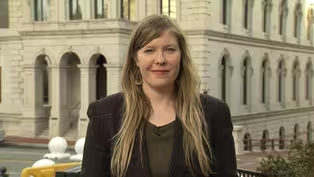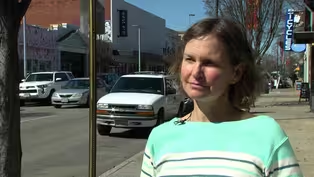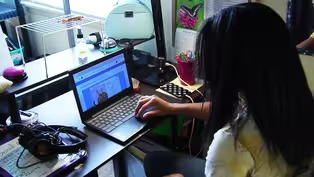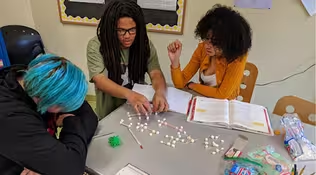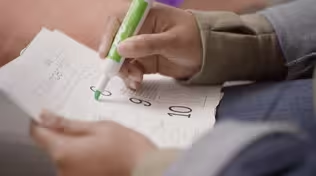VPM News Focal Point
Education | March 17, 2022
Season 1 Episode 4 | 26m 46sVideo has Closed Captions
Learn how Virginias are navigating the changing education landscape.
The pandemic pushed some Virginia teachers to the brink of burnout; how are they coping now, and how can communities support them? Homeschooling is on the rise nationwide; meet local parents and students who’ve shifted to home-based curriculum.
Problems playing video? | Closed Captioning Feedback
Problems playing video? | Closed Captioning Feedback
VPM News Focal Point is a local public television program presented by VPM
The Estate of Mrs. Ann Lee Saunders Brown & Dominion Energy
VPM News Focal Point
Education | March 17, 2022
Season 1 Episode 4 | 26m 46sVideo has Closed Captions
The pandemic pushed some Virginia teachers to the brink of burnout; how are they coping now, and how can communities support them? Homeschooling is on the rise nationwide; meet local parents and students who’ve shifted to home-based curriculum.
Problems playing video? | Closed Captioning Feedback
How to Watch VPM News Focal Point
VPM News Focal Point is available to stream on pbs.org and the free PBS App, available on iPhone, Apple TV, Android TV, Android smartphones, Amazon Fire TV, Amazon Fire Tablet, Roku, Samsung Smart TV, and Vizio.
Providing Support for PBS.org
Learn Moreabout PBS online sponsorshipANGIE MILES: The pandemic has prompted major changes in the way we educate our children.
An unprecedented number of families are opting to just stay home.
We'll share one of those stories.
Sadly, a large number of teachers are staying home as well.
We'll report on teacher burnout and what that means for the future of the profession.
And we'll examine a nontraditional approach to learning that has excited high school students, some for the first time.
You're watching VPM News Focal Point.
Production funding for VPM News Focal Point is provided by Dominion Energy, dedicated to reliably delivering clean and renewable energy throughout Virginia Dominion Energy Actions Speak Louder The estate of Mrs. Ann Lee Saunders Brown and by ♪ ♪ ANGIE MILES: Thank you for joining us for VPM News Focal Point.
I'm Angie Miles.
Today we're examining the state of education in Virginia.
First though, a snapshot of news from around the state.
Virginians are feeling the pain at the pumps.
Gas prices now surge over $4 a gallon, as Russia continues its violent invasion of Ukraine.
Lawmakers are urging Governor Glenn Youngkin to activate the commonwealth's anti-price gouging law to help.
From Chesterfield to Chesapeake, more than five dozen police officers have been decertified statewide.
Most were penalized for lying, which bars them from any law enforcement job.
Before reforms were enacted last year, only 83 officers had been decertified in the past 20 years.
In Newport news, 10,000 shipyard workers sailed to a victory winning increased pay, better benefits, and more time off in a union-backed contract with the parent company.
The workers build the nation's nuclear-powered aircraft carriers and submarines and service US Navy vessels.
In Loudoun County, the United States Tennis Association plans to build a $42 million facility to serve the region's tennis enthusiasts and pro players.
The sprawling 36 court campus will host daily tennis programs when it opens in 2025, making the sport more accessible to the public.
In Richmond, nearly 70 youth entrepreneurs flexed their budding business skills at the fifth annual Children's Business Fair.
10 year old Sterling Brayboy, founder of Fruit Juicery Stirbeezie's was among those selling their wares and networking at the event, which bolsters the next generation of business leaders.
♪ ANGIE MILES: Virginia's General Assembly ended last weekend.
VPM News education reporter, Megan Pauly is at the Capitol with an update on key education bills from the 2022 legislative session, Megan?
MEGAN PAULY: Hi Angie, yes, education has been a huge topic of debate this session in large part because Governor Glenn Youngkin asked lawmakers to to put forward several education related bills but with such a politically divided legislature, the success of those proposals has been mixed.
Bills that sought to ban the teaching of quote "inherently divisive concepts" failed, but legislation was approved that will allow parents to opt their kids out of sexually explicit content in schools.
And all schools will be required to have those policies approved and in place by January of next year.
Also a law did not pass that sought to require police presence on every public school campus in Virginia.
However, school principals will be required to report all low-level offenses, school fights and marijuana possession to law enforcement.
This reverses a bill that was passed in 2020 that gave principals discretion in reporting these offenses to law enforcement, Angie.
ANGIE MILES: I understand bills aimed at loosening guidelines for charter schools did not pass, have lawmakers approved funding for university run lab schools?
MEGAN PAULY: Not yet Angie, budget talks are still going on and some lawmakers are hesitant to sink $150 million into startup costs for these new schools when the long-term financial sustainability of them is uncertain and when lawmakers haven't had a chance yet to gauge interest from universities and look at their proposals.
It's estimated that to replace all Virginia public schools that are over 50 years old, it would cost about $25 billion.
ANGIE MILES: Megan, what about changes being made to the current lab schools law?
MEGAN PAULY: Currently, Virginia universities are allowed to run public schools as long as they're operated in conjunction with a teacher education program but there aren't any of these schools in Virginia right now, so lawmakers are changing the law to remove the requirement of the teacher education program to allow universities to focus on other specialized content areas like STEM for example.
ANGIE MILES: Thank you, Megan.
Megan Pauly reporting.
While lawmakers have adjourned for the time being, it's expected they will convene a special session to work on the state budget.
Some of the education issues lawmakers debated are still top of mind for many Virginians.
Keyris Manzanares tells us more in this week's 'People of Virginia' segment, Keyris.
KEYRIS MANZANARES: Thanks, Angie.
Education was the issue that some say sealed the win for Governor Youngkin in 2021.
There are clear dividing lines, and most people have strong opinions.
We ask Virginians what they see as the biggest challenges in our education system.
Here's a sampling of those responses.
JO ANN KACANI: I have taught in the private community and the counties, and did some student teaching in the cities.
There just seems to be, as always when it's tax based, such a difference between the two schools.
ANGELA WALLER: Finding good teachers and having teachers that are going to teach my children, according to their culture and their lifestyles.
JONATHAN COLEMAN: Teachers, especially in public schools, work well more than 40 hours a week.
So, I would love to see them being paid both for the level of education that they have, as well as the experience and the sheer amount of work hours that they put in.
If you have strong opinions about Virginia's educational challenges, we'd like to know.
After you watch today's stories, please consider sharing your thoughts on our website at vpm.org/focalpoint.
Angie.
ANGIE MILES: Thank you, Keyris.
The coronavirus pandemic changed many things in our society, including how children learn.
As COVID-19 pushed schools to close their doors and move to virtual or hybrid learning, parents had to find the best option that worked for their families.
Since 2019, homeschooling in Virginia has increased by nearly 40%.
Many parents who made the switch say they don't plan to go back to traditional in-school learning.
Keyris Manzanares has the story.
KEYRIS MANZANARES: The popularity of homeschooling increased rapidly in Virginia after COVID-19 forced classrooms to shut down in March 2020.
Data from the Department of Education shows that nearly 62,000 Virginia students are being homeschooled this school year.
That's a 40% increase since 2019 when COVID hit.
SHANELL ANDERSON: Once everything started getting crazy, I just decided to keep them home and try to see where everything would go from there, and here we are, still homeschooling to this day.
KEYRIS MANZANARES: That's Shanell Anderson, one of many parents left scrambling to find an education alternative for her two children when the pandemic hit.
A big factor for her, she and her son are considered high risk.
Anderson says she's always wanted to homeschool, and the pandemic gave her that extra push she needed.
SHANELL ANDERSON: Honestly, homeschooling is really what I wanted to do from the beginning, since they were really small, you know?
I wanted to have them home with me all the time.
So, it's kind of a blessing in disguise, I say.
KEYRIS MANZANARES: At first, Anderson says they were learning as they went, but then she switched to a homeschooling program from K12.com.
A big benefit of homeschooling Anderson says is that she can spend more quality time with her children.
SHANELL ANDERSON: With homeschooling, I'm with them a lot.
I didn't really like the idea of us waking up in the morning, having to rush out to get to school, get to work, they're at school all day, I'm at work all day.
KEYRIS MANZANARES: She's also learning who they are.
SHANELL ANDERSON: As a parent, homeschooling my children has taught me so much about my kids.
I mean, taught me how different they are, how different they learn, how different they perceive everything.
KEYRIS MANZANARES: On top of being ahead of their schoolwork, Anderson's children are also very active.
SHANELL ANDERSON: But I keep them in activities, a lot of afterschool activities, to try to keep them social.
They're in the YMCA, boxing, gymnastics.
KEYRIS MANZANARES: Anderson isn't alone in her homeschooling journey.
Yvonne Bunn, Director of Government Affairs for the Home Educators Association of Virginia, says they've had to hire more staff to support more homeschooling families.
YVONNE BUNN: As soon as the pandemic began to affect school children, we began seeing parents who were not being successful with what was being offered with online education or their children sitting in front of a computer.
KEYRIS MANZANARES: Bunn says homeschooling is booming across the state.
YVONNE BUNN: Our largest homeschool population is in Northern Virginia, and then the Tidewater area, and then Richmond.
But we are definitely seeing a lot of growth in the more rural areas also.
KEYRIS MANZANARES: Bunn says the homeschool population is very connected to support groups like co-ops, that have been around for decades.
YVONNE BUNN: The idea that homeschool families are home all alone by themselves, that is not the way it is.
KEYRIS MANZANARES: Cultural Roots Co-Op is one of over 100 homeschooling co-ops in the state.
Alycia Wright, Director of Cultural Roots, is a former public school teacher.
ALYCIA WRIGHT: This co-op is really special to me because I built it originally as I homeschooled my oldest daughter.
Here in the co-op, we offer all sorts of activities, not just academics, but also cultural arts.
KEYRIS MANZANARES: Cultural Roots mom, Nikiya Ellis, says her son is thriving.
NIKIYA ELLIS: There are so many different opportunities for him to learn in different ways.
So, he's dancing with his friends, they're doing capoeira, they're doing yoga, he's playing chess.
KEYRIS MANZANARES: As Virginia's education landscape evolves, homeschooling is the right fit for some families.
ALYCIA WRIGHT: The biggest impact, I think, COVID has had was helping parents realize that this is a possible pathway, this is a possible lifestyle.
KEYRIS MANZANARES: Reporting for VPM News Focal Point, Keyris Manzanares.
(people chattering) ANGIE MILES: In September, 2021, former Governor Ralph Northam reopened Virginia's 132 school divisions for full-time in-person learning.
Some homeschool students returned to the classroom, but thousands of others continue learning at home.
♪ ANGIE MILES: The special education administrator of Virginia's third largest school district just resigned citing concern for student safety and education equity in Loudoun public schools.
Recently, a group representing Virginia's school superintendents condemned Governor Glenn Youngkin for reversing school equity initiatives.
Last month, Montgomery County School Board Chair stormed out of a heated meeting as parents protested mask mandates.
Meanwhile, evidence of significant student learning loss nationwide due to the pandemic is still emerging.
As we listen to these loud debates, where are the voices of our teachers?
Some of those closest to our students are shutting down and dropping out.
AUDRINA FARRAR: Ever since I was a child, I used to love to play school.
I always had to be the teacher, of course.
So I'm from Dinwiddie County, it's a really small town in southern Virginia.
There were not a lot of Black teachers, but one that stands out to me is Ms. Barksdale.
She was my first-grade teacher, and I was just so thrilled to have someone that looked like me to teach me.
It made me feel like, "Hey, like this is something that you can do, you know, when you grow up."
I just truly wanted to make a difference, and I just loved school.
Like, I've always loved school.
I'm a kindergarten teacher, so my students are very little.
They can't do a lot of things independently.
We have a lot of multi-generational households where grandma or grandpas are raising the kids, and they're not very tech-savvy.
So, it was very difficult.
Now that we're back in person, we're kind of the gatekeepers of policy in regards to health, like things coming from the CDC and the local government, which is a new, you know, we have a lot of roles already, but this is something new, that we're dealing with.
A lot of the times, when people get upset about these policies, we're the forefront, we're the face of what they are upset about.
So that's been a very difficult position to be in.
Dealing with the students, that's the easiest part (laughs) of teaching right now.
All of the hard things are all of the initiatives coming down and then also just how everything is so politicized now.
At the beginning of the pandemic, we were heroes you know, people appreciate like "How do you all do this," but as time has gone on, it kind of feels like we're the enemy.
And that's just very, it's just very disheartening to hear or see comments about people complain about teachers.
"Oh, well, if you all don't want to work, find another job."
It's very disheartening to us.
We're telling the powers that be like, "This is unrealistic.
Like this is, we can't do this."
And just not being listened to is a big factor contributing to burnout.
And then the pay does not help.
We're just not being compensated for the work that we're doing.
MARY BETH WALSH: Burnout is basically chronic unmitigated stress in the workplace.
Stress is normal, we all experience stress.
The issue with burnout is that it's stress that has been going on for some time and hasn't been checked.
AUDRINA FARRAR: I know a lot of teachers before the pandemic that have transitioned out, have gone to other careers, and this was burnout before the pandemic.
And now we've added in all of these other things.
And then just going through a traumatic event, it's really sent a lot of people over the tipping point.
When I see veteran educators leaving, it's scary.
I get worried about the state of education.
I'm seeing a lot of people, my age, you know say, "This is not worth it.
I can go find something else to do."
We don't even have the teachers to replace the ones that are leaving.
It's just not enough people that are interested in doing the job.
SAMANTHA WILLIS: There are more than 105,000 educators currently teaching in Virginia, but there are also thousands of educator vacancies for the 2021-2022 school year, across 132 divisions, the Virginia Department of Education reports that the highest teacher shortages are in special education, elementary and middle school education.
RYAN BURGESS: I think most educators would say that they entered education to change the world.
And that is certainly the spirit that I brought to my job, when I first began teaching.
My mom was a teacher, my grandmother was a teacher, my brother's a teacher, my cousin.
From college down to elementary school, we have all taught on a variety of different levels.
I was passionate about history, and when I was able to get students to look into the past of their families and find family stories that they could connect to, that was always a really special moment for both me and for the student.
A teacher in a room with students and what happens there is magic, is absolute magic when it works well.
Education is in a crisis, across the commonwealth and across the United States.
A lot of people don't understand that teachers spend umpteen hours outside of their contractual obligations to grade papers, to plan lessons, to pull together resources, to talk with students, to talk to parents, all of that is unpaid labor at this point in time.
Teachers are paying out of pocket for hundreds of dollars a school year, just to provide students with basic things like scissors.
I was doing okay, rolling kind of with the pandemic.
It was difficult for sure but when we came back from the pandemic to full-time teaching, our administrators were contact tracing.
And so they weren't there to support teachers in the classroom.
Teachers are covering a lot of classes for other teachers who aren't able to be in the building.
And when you're responsible for a class you don't have time to do planning, to do grading, to answer emails from parents, to answer emails from students.
As you can imagine our students have been under enormous pressure.
We saw a lot of our students really struggling with dysregulated behaviors in the classroom, and not having enough support.
MARY BETH WALSH: There are two areas of symptoms, there's the physiological and then the psychological.
So physiologically, you could have things like insomnia, change of appetite, headaches, stomach aches, more head colds you're noticing, exhaustion.
For the psychological symptoms, you could have things like lack of productivity, disinterest, cynicism, quick to anger.
RYAN BURGESS: We're asked to be parents, to be nurses, to be social workers, to be teachers, education professionals.
And over time it becomes too much.
And so all of that just made it increasingly difficult to go into the classroom everyday.
I would drive to work and sit in my car and not want to go in.
And then just feeling like I wasn't making a difference anymore.
Part of my burnout was centered around the fact that I had spent so many years in the classroom.
I would encourage younger teachers to take their personal time, utilize the resources that are available to you whether that is the employee assistance program or whether it is a matter of sitting down with your administrator and having a difficult conversation about the fact that you are feeling burnt out and you do need more support.
MARY BETH WALSH: So with burnout the first thing that someone would want to do is to reach out to a provider, stress can happen for any reason.
So get to the root of the problem.
And then the provider can really help to determine what those next steps might be.
Some things that might help to lessen the burnout is realizing that one of the issues is lack of control.
So trying to figure out how you can get control back in your workplace, how you can get autonomy back in your workplace, how you can potentially get a more supportive environment in your workplace.
So those are some things to talk with your employer about, also bringing your other coworkers and see if they're experiencing similar things in gaining that support from your fellow coworkers.
RYAN BURGESS: Unfortunately, I think my experience is not unique at all.
I was an early member to this Facebook group called HCPS Back to School Safely, and we began organizing just as community members and educators in response to the pandemic.
AUDRINA FARRAR: It's a place for teachers to talk about things that may be going on in their school, sharing different instructional practices or things to help during this time.
And also, you know, some advocacy work and trying to stand up for ourselves and have a voice.
So just making it easier for people to become more involved in local government.
We have about, I think 3,000 members making sure that we are physically present in those environments where those decisions are being made so they can see, "Hey, these teachers are here and they're invested in this."
So we're out there trying to be a presence and trying to show them that we care.
And we are out here and we want our voices to be heard.
ANGIE MILES: A 2021 National Education Association Survey found 32% of teacher respondents will leave the profession earlier than they'd planned, prompted by the pandemic.
Find more data and resources for teachers at vpm.org/focalpoint.
♪ ANGIE MILES: The more we learn about how we learn, the more personalized or differentiated instruction can be, and the more successful students can be.
Most schooling is dependent on strong verbal and written skills, but what if we can leverage being smart about nature, music, movement or relationships into academic success?
Welcome to the Howard Gardner School.
[TEACHER]: So is this perpetual is it, the marble's supposed to get reloaded automatically?
[STUDENTS]: Yeah, it has to get to and it go from here.
NATALIE SHAPIRO: It's not that something is wrong with me.
It's that I have different ways of learning that aren't suitable for certain schools but here they taught me that everyone is different.
Everyone learns in different ways and that can be accommodated for.
[Teacher] So now you're working on various methods, right?
Why would this potentially possibly work?
I have to be able to explain this.
ERICK JOHNSON: The Howard Gardner school was founded by Katherine Keith and Emily Pavot and Addison Helmke.
This school was not named The Howard Gardner School in the first year.
So it was named the Transitional School, kind of a terrible name.
And the students realized that very, very quickly.
And they said, well, you know, this place is about different kinds of brains coming together and being more than the, than the sum of their parts.
And there's, there's a psychologist that they had been learning about in their psychology class, and that's Dr. Gardner, Dr. Howard Gardner.
The theory of multiple intelligence is is best defined by Dr. Gardner's quote, which says, "It's not how smart are you but how are you smart?"
MICHAEL PETRILLI: The classes are smaller.
So you don't have to compete to say things in class.
And they still teach it pretty - they teach things hands on, but it's kind of laid back.
So you have more comfortability in the classroom.
MADISON BROWN: My freshman year, I was in public school and I felt like I didn't get what I needed because I wasn't really doing what I needed to do.
And then when I came here it was like, oh wow, it's different.
The structure's different.
The learning's different.
The teaching's different.
You more have a bond.
And then it's like, they're hands on.
You're like you got it.
And I believed in myself that I can really do it.
And now I think that I can do it.
ERICK JOHNSON: There are no simple problems left in the 21st century.
There are only complex problems.
And so a team in order to be as effective as possible needs to be intentionally diverse, not out of some sense of, because that's good or ethical, but because it's powerful.
Diversity in and of itself is a force multiplier.
JEREMIAH LONG: I ended up coming back here, because sometime in college I saw a need for not only Black educators but also I'm passionate because I love to teach people the things that I was not taught.
Right, I'm passionate because I I love to see students come up with that, like, oh I never even thought of that before.
Right, it's like, oh, that's incredible.
I never saw myself in this light.
I never saw my friends like this.
EVAN DEVEREUX: I remember after being here for the first two weeks with all the interactive activities that we get to do and how engaging the teachers are, you wake up every morning, you're like sweet, I get to go to this school, which makes it so much better than anything you could possibly think of.
ANGIE MILES: The Howard Gardner School is intentional about keeping its student body small, but they are in the process of opening a second campus.
We always welcome your feedback on our program.
Just go to vpm.org/focalpoint.
Thank you for watching.
We'll see you next time.
Production funding for VPM News Focal Point is provided by Dominion Energy, dedicated to reliably delivering clean and renewable energy throughout Virginia Dominion Energy Actions Speak Louder The estate of Mrs. Ann Lee Saunders Brown and by ♪ ♪
Video has Closed Captions
Clip: S1 Ep4 | 2m 42s | Education reporter Megan Pauly gives an update on General Assembly 2022 education bills. (2m 42s)
Education | People of Virginia
Video has Closed Captions
Clip: S1 Ep4 | 40s | Virginian's share their thoughts on the commonwealth's education system. (40s)
Homeschooling is on the rise due to the COVID-19 pandemic
Video has Closed Captions
Clip: S1 Ep4 | 3m 52s | Since 2019, the number of students being homeschooled in Virginia has grown by nearly 40%. (3m 52s)
The power of diversity in education
Video has Closed Captions
Clip: S1 Ep4 | 2m 53s | The Howard Gardner School is based on the idea that there are many ways to be smart. (2m 53s)
Teachers speak from the brink of burnout
Video has Closed Captions
Clip: S1 Ep4 | 9m 3s | Educators explain burnout’s impact on teachers and students. (9m 3s)
Providing Support for PBS.org
Learn Moreabout PBS online sponsorship
- News and Public Affairs

Top journalists deliver compelling original analysis of the hour's headlines.

- News and Public Affairs

FRONTLINE is investigative journalism that questions, explains and changes our world.












Support for PBS provided by:
VPM News Focal Point is a local public television program presented by VPM
The Estate of Mrs. Ann Lee Saunders Brown & Dominion Energy
